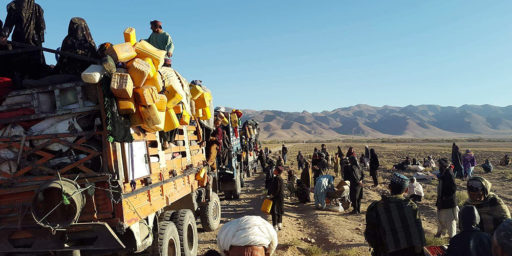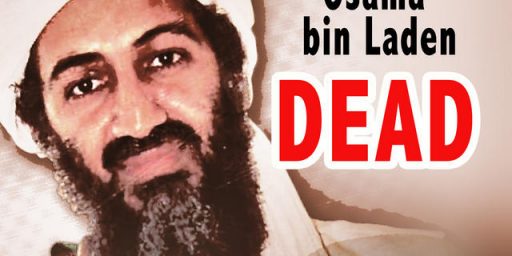U.S. Strike Kills Afghan Taliban Leader
Akhtar Mohammad Osmani, a top leader in the Taliban, was killed in a U.S. airstrike.
A top Taliban military commander described as a close associate of Osama bin Laden and Taliban leader Mullah Omar was killed in an airstrike this week close to the border with Pakistan, the U.S. military said Saturday. A Taliban spokesman denied the claim.
Mullah Akhtar Mohammad Osmani was killed Tuesday by a U.S. airstrike while traveling by vehicle in a deserted area in the southern province of Helmand, the U.S. military said. Two associates also were killed, it said.
There was no immediate confirmation from Afghan officials or visual proof offered to support the claim. A U.S. spokesman said “various sources” were used to confirm Osmani’s identity.
Osmani, regarded as one of three top associates of Omar, is the highest-ranking Taliban leader the coalition has claimed to have killed or captured since U.S. forces invaded Afghanistan to oust the Taliban regime in late 2001 for hosting bin Laden.
We’ve killed enough #2 and #3 leaders in various al Qaeda affiliated groups at this point that we can be reasonably sure that it’s not going to have much impact in Iraq. On the other hand, there does seem to be a widespread consensus that al Qaeda proper is a shadow of its 9-11 self. And, certainly, to the extent that the only good terrorist is a dead terrorist, killing them off is worthwhile for its own sake.





I’m sure someone will be along shortly to insult us for our “glee” in the death of a “fellow human being.”
James,
While a dead terrorist is certainly a good terrorist in the sense that they themselves are no longer terrorizing, the process of making them dead often seems to generate an indeterminate number of live terrorists.
However, the British experience in Northern Ireland (IRA/Sinn Feinn)and earlier in Israel (Irgun/Likud) seems to suggest that keeping the more moderate terrorist leaders alive long enough to become ex-terrorists who put down their weapons and renounce violence seems to have the effect of stopping the generation of new terrorists for that particular cause…umm…dead.
I will let you do the math yourself.
At least one terrorist recognised as such at the time by the US and UK has gone on to win the Nobel Peace Prize. Guess? Menachem Begin. Israel wouldn’t even exist as a modern state if the overly-simplistic neocon formulation you’re repeating had been applied then. Personally, I’m glad it wasn’t.
Regards, C
Cernig,
I’m not sure that the idea that killing terrorists is good has anything to do with neo-conservatism.
That aside, while I agree that “the process of making them dead” can be a mixed bag, indeed, their death is generally good.
Nelson Mandela is probably a cleaner case than Menachem Begin of terrorist turned statesman. Plus there’s that guy on Battlestar Galactica who has turned out to be a pretty decent fellow. Still, keeping terrorists around in the hopes that they wind up good enough in the long term to outweigh the murders they committed in their youth seems problematic at best.
James,
I didn’t say that “the idea that killing terrorists is good has anything to do with neo-conservatism”. What I said was that the idea that the only good terrorist is a dead one is a popular neocon one – plus, I felt you had used the phrase without full consideration. It’s concommitant with the idea that “we don’t negotiate with terrorists” and is, like all neocon notions, fatally simplistic. Thanks for bringing up Mandela, another very good example of someone the uber-right would never have negotiated with.
Regards, C
I wonder how all those dead people feel, the ones who were killed before the terrorist came to his noble epiphany??
James,
Oh, and in what sense is playing whack-a-mole with ever-regenerating generations of terrorist not problemmatic?
In the real world, eventually negotiation has to take place. Far better if you can pre-select more moderate leaders for the terror-movement-cum-political-party by figuring out the best candidates (intel) and keeping them alive (maybe in jail for a while) while helping their powerbase (targeted strikes on their rivals). The best extant example remains British action against the IRA in Northern Ireland.
Of course, that may be exactly what’s happening with A-Q. It’s possible, I suppose.
Regards, C
DaveD,
I dunno. I suppose we could ask them, and at the same time we could ask them how they feel about the prospect of their great-grandchildren not being slaughtered in the same manner.
Oh, wait…
Regards, C
Number 2 is dead. Long live Number 2, as they say.
Cernig,
The problem with negotiating with terrorists is that doing so legitimates them and encourages more terrorism. Who would negotiate with the likes of Yasir Arafat, otherwise?
As for Mandela, he had natural sympathy because of an obviously just cause. He only became someone worthy of negotiation, though, after decades in prison. Had he been out there ordering the necklacing of innocents, it would have been rather hard to transform him into his statesmanly role.
At some point, some terrorist organizations control territory and create political wings. ANC became a party, as did Sein Fain, as has Hamas. At that point, you can negotiate with the political wing and pretend that they’re somehow distinct from the murdering wing, although that’s problematic as well. But, surely, one can’t negotiate directly with Bin Laden and company?
“there does seem to be a widespread consensus that al Qaeda proper is a shadow of its 9-11 self.”
Oh really? Based on what?
How big was al-Q pre 9/11?
How big is it now?
James,
surely, one can’t negotiate directly with Bin Laden and company?
Ah, now we’re talking specifics rather than nonsensical generalisations. Good. I agree that’s problemmatic in the extreme. There’s no handle as yet. However, it may be that even there we could find moderates amenable to becoming politicals rather than fugitives. And the Taliban? They’ve already been a political party, albeit a truly noxious one. There might be a more moderate wing there too.
I suppose we could always outright ask their masters, the Pakistani ISI. We know where their HQ is, right? Wouldn’t that open a political can of worms, admitting we (bi-partisanly) had backed a state sponsor of Islamic terror all along?
But many just don’t seem interested in finding out, which seems like cutting your hand off to spite your granchildren’s face. I suspect that, in the bi-partisan corridors of power, it is more about vote-winning rhetoric (and not opening that can of worms) than about ideology.
Regards, C
James,
I can’t resist: As for Mandela, he had natural sympathy because of an obviously just cause.
Yeah.
Regards, C
Cernig:
During the Cold War, a lot of folks thought that backing a pro-Communist terrorist organization over the very anti-Communist National Party was counterproductive. And Mandela did in fact refuse to renounce murder as a political tool, which is why he remained in jail for so many years.
People, including Dick Cheney, nonetheless opposed Apartheid as a policy and sympathized with the cause of freedom. The debate was over how to achieve that without the Zimbabwaification of South Africa.
Hi James,
I’m glad to see you moved from a universal declaration to a stance that nuance is everything in these matters, all in the course of one day. The latter position was the whole thrust of my original comment so now we agree on the principle even if not on all the nuances. I’m just fine with that.
Have a Merry Christmas, James, and my sincere thanks for your blogging work these past few months – you do a lot to keep my brain alive and working.
Regards, C
The more we think about negotiating with religious fanatics, or dreaming up any negative aspect to killing the enemy, (for the sake our own personal comfort of intellectual superiority here at home), the war is lost. Truly sad.
LJD,
Your comment is an absurd misreading of what cernig posted–it has to be obvious that his point about killing terrorists/refusing to negotiate with terrorists has nothing to do with some amorphouse “pesonal comfort of intellectual superiorty here at home”–(something of course that we used to call our moral sense but I digress). Cernig specifically makes the argument on utilitarian/practical grounds that continuing to kill many individuals labled terrorist both breeds more avengers (me against my brother, my brother and me against my cousin, my cousins against the world etc…) and limits the possibility (and he offers some serious real world examples) that the terrorist community can and will eventually throw up some statesmen capapble of negotiating a peace and stabilizing their own societies. That isn’t a failure of will a la tinkerbell (Oh my god, someone mentioned diplomacy! all is lost) but a simple recognition that as time marches on some strategies, even terrorism, lose their magic and cease to be effective. A wise state and a wise ruler (alas that we have neither) takes that into account, takes the long view, and works even with its enemeies to secure the peace it wants. War is politics with bombs. Its not an end in itself, except for bush and his buddies.
aimai